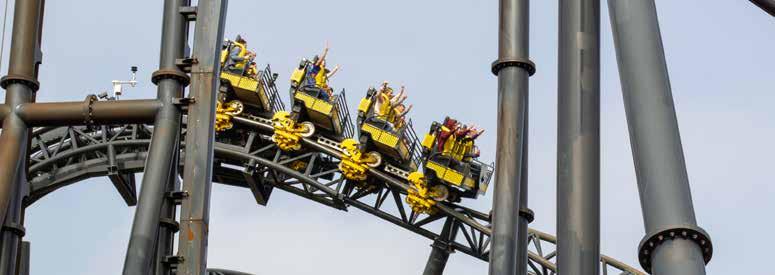PLUNDERING PIRATES
Are you still free?
MALE BODY DYSMORPHIA
LUDDITE TEENS

volume 22 | august 2023
Hello everyone,

Welcome to WaspReporter Magazine, Volume 22. For 50 years now WaspReporter – and its predecessors Wasp Newsletter and The Reporter – has been the leading English-language magazine for Dutch secondary-school pupils like yourself. And we hope to add at least 50 more years to this anniversary!
For many people, sitting exams is stressful and nerve-wracking – even more so when you can’t specifically prepare for a test by reviewing and learning facts by heart. Language exams are a notorious example of tests for which preparing is often difficult. How do you know you’re ready for a listening exam or a writing test?
In most cases practising is the only thing you can do. And that is precisely the reason we have compiled this Exam Issue of WaspReporter for you. The Magazine is divided into three sections: speaking, writing, and reading. The Student File offers ample opportunity to practise these skills. There you will also find ‘Coaches’ filled with tips and tricks aimed specifically at passing your exams. Finally, the Student File offers you the opportunity to practise your listening skills in a meaningful way. Having worked through this issue, you will hopefully feel more confident about sitting your exams. Break a leg!
Enjoy!
Johan Graus Editor
SCAN THE QR CODE TO ACCESS THE AUDIO FILES
Have you ever wanted to be famous? The answer might be ‘no, no way’. But it might be a yes. And why not? Fame seems to offer huge benefits, but we also know being a celebrity comes at a huge cost. Today, we examine how fame can affect a person’s psychology.
LISTENING () () () () () () () SPEAKING Revolutionary inventions Future cities Lab rats Advertisements Luddite teens Advertisements Dogs behind bars Pirate booty Male body dysmorphia Are you still free? 3 4 6 8 10 12 14 16 18 21 WRITING READING volume 22
Humans have created some amazing – and sometimes unconventional – inventions. From the moment someone smashed a rock on the ground to make the first sharp-edged tool, to the introduction of the Internet, several key innovations stand out as particularly revolutionary. Here are our top picks for the most important inventions of all time.

The wheel
Before the invention of the wheel in 3500 BC, humans were very limited in how much stuff they could transport over land, and how far. The wheel itself wasn’t the most difficult part of ‘inventing the wheel’. When it came time to connect a non-moving platform to a rolling cylinder, things got tricky. The stroke of brilliance was the wheel-and-axle concept. Wheeled carts made agriculture and commerce possible by enabling the transportation of goods to and from markets, as well as easing the burdens of people travelling great distances. Now, wheels are vital to our way of life, found in everything from clocks to vehicles to turbines.
The printing press
German inventor Johannes Gutenberg invented the printing press sometime between 1440 and 1450. The invention exponentially increased the speed with which book copies could be made, and thus led to the rapid and widespread spreading of knowledge for the first time in history. Among other things, the printing press made wider access to the Bible possible. This in turn led to new interpretations, including that of Martin Luther, whose ‘95 Theses’ – a document printed by the hundred thousand – started the Protestant Reformation.
The telephone
Several inventors did pioneering work on electronic voice transmission, but it was Scottish inventor
INVENTIONS
Alexander Graham Bell who came up with a simple receiver that could turn electricity into sound. He was the first to be awarded a patent for the electric telephone, on March 7, 1876. Three days later, Bell made the first telephone call to his assistant, Thomas Watson, uttering the now famous phrase, ‘Mr Watson, come here. I want you.’ Bell’s interest in sound technology was deep-rooted and personal, as both his wife and mother were deaf. The invention quickly took off and revolutionised global business and communication.
Penicillin
It’s one of the most famous discovery stories in history. In 1928, the Scottish scientist Alexander Fleming noticed a bacteria-filled Petri dish in his laboratory with its lid off. The sample had become contaminated with a mould, and everywhere the mould was, the bacteria were dead. That antibiotic mould turned out to be the fungus Penicillium, and over the next two decades, chemists purified it and developed the drug penicillin, which fights a huge number of bacterial infections in humans without harming the humans themselves.
The Internet
The road to creating the Internet started long before the technology needed for the Internet even existed. In the 1960s, a team of computer scientists working for the US Defence Department built a communications network to connect their computers, called ARPANET. Multiple computers were now able to communicate with one another on a single network. In 1989, the Internet evolved further thanks to the invention of the World Wide Web by computer scientist Tim BernersLee. This development opened up the world of the Internet to everybody and connected the world in a way that it had never been before.
3 exam issue | volume 22 SPEAKING LIVESCIENCE ( ) 1 5 10 15 20 25 30 35
40 45 50 55 60 65 70 © ISMAGILOV / GETTY IMAGES
Our lives would not be the same without these inventions REVOLUTIONARY
How to build the metropolises of tomorrow
 By Ian Evenden
By Ian Evenden
Future cities
The world’s cities are changing. Paris’s Champs-Élysées, one of the most gridlocked roads in the world, is going to become a giant garden. Barcelona has closed off its oldest quarters to cars. And now Milan is on the path to becoming the world’s first 15-minute city (read on to find out what that means).
It seems the time has come to reimagine how we see the future of our oldest cities. Why? Well, there was a small exodus out of our urban spaces during the Covid-19 pandemic. It was the slightest of pauses in the net migration from rural to urban areas that has taken place for decades. Those who could afford to leave left. For those who remained, the lockdowns shone a harsh light on most cities’ biggest flaws: clogged roads, polluted air, and a dearth of green, communal spaces.
Now, it seems that pause has
inspired the world’s urban planners to rethink how cities around the world can evolve to take a different path. Here’s how our cities could change course.
Create 15-minute cities
An idea that’s catching on in capitals around the world is the 15-minute city. This changes the city from a dense centre with surrounding suburbs into a series of hubs within which are shopping and entertainment facilities. None of these hubs is more than a 15-minute walk or cycle from where people live, and many people may live close to more than one hub. The 15-minute city idea comes from Colombian academic Carlos Moreno, a professor at the Sorbonne University in Paris, and has caught the attention of Paris’s mayor, Anne Hidalgo.
Creating 15-minute cities relies on new infrastructure, to allow
people to walk and cycle safely to their destinations, and this can create problems. ‘A complicated, fast-moving system where millions of people all, at the same time, understand, agree, and accept the rules is not going to happen,’ says Dr Ian Walker, professor of environmental psychology at the University of Surrey.
‘It’s far better to have a system where it doesn’t matter whether you agree with the rules or not, it’s still safe. You can start to do things in towns if you have a segregated cycle infrastructure, or better still, a segregated driving infrastructure that keeps the drivers safely out of the way of everybody else.’
In Paris, enough segregated cycle lanes are being created so that they can be used for most bike journeys of a kilometre or so, while the main junctions that feed traffic into the city centre are
© KARELNOPPE, OLRAT / SHUTTERSTOCK 1 5 10 15 20 25 30 35 40 45 50
SCIENCE FOCUS ( )
4 exam issue | volume 22
55 60 65 70 75 80
being made safer for cyclists coming from the suburbs. A huge number of metal arches for chaining bikes to during the day are expected to appear on the city’s streets, along with 50,000 additional cycle parking spaces.

And it’s not just Paris. There has been interest in the 15-minute concept from Latin America and China. Limited trials have also begun in cities such as Houston, Milan, Brussels, Valencia, Chengdu, and Melbourne.
Rewild the city
Many people find that time spent in nature relaxes them and improves their mental health. The benefits of being among nature are backed by science, with studies showing a link between improvements in mental health and nearby green spaces. Hence the growing calls to rewild our cities, so city dwellers can enjoy a connection with nature, too.
With cities responsible for 80 per cent of the world’s greenhouse gas emissions, they contribute heavily to climate change. And with so many built at sea level, they’ll disproportionately feel the effects. An injection of green into urban spaces can help with carbon absorption, improve air quality, and mitigate flooding.
To this end, tall buildings in Singapore are being built with vertical gardens on their sides, while lessons learned from termite nests are being used in
Zimbabwe to design buildings that stay cool without air conditioning.
There’s also some evidence that poor air quality could affect the microbiome in our digestive systems, causing inflammation of the gut. A 2017 paper published in The Lancet showed that inflammatory bowel disease is more prevalent in industrialised, urban societies, while studies at Ohio State University that exposed mice to air pollution saw them become anxious and depressed, grow more body fat, and become less sensitive to insulin than a control group breathing filtered air.
A study of more than 600 children in Belgium found that an extra 2.6 points could be added to IQ scores just by increasing the greenery in their environment by 3 per cent. Trees were found to be more beneficial to children’s development than open land such as farms. Meanwhile, a study from the London School of Economics suggests that crime is lower in areas with trees, with the research finding that for a ‘10 per cent increase in tree canopy cover, there was a 15 per cent decrease in violent crime’.
A solution for the last mile
One of the most important changes cities must make to improve life in them is to separate people from their cars. Even when you have a strong public transport
system moving people between population hubs, the last mile – that section between the railway station and someone’s home, for example – can lead to car use if it’s considered too far or too dangerous to walk.
The idea of a low-traffic neighbourhood (LTN) – where cars are banned from quieter ‘rat runs’ to keep them on the major routes – has taken off in parts of the UK. LTNs attempt to filter out cars from residential streets using bollards, camera-controlled gates, or even planters full of flowers placed across the road, while pedestrians, cyclists, and emergency vehicles can still pass. London had almost 3,700 such schemes in 2021, with as many as 25,000 traffic filters in place across the UK.
Also popular are e-scooter hire trials, which are taking place in cities including Middlesbrough, Bristol, and Chelmsford. The trials see gaggles of electric scooters available to be picked up from street corners. The scooters are hired using an app and then parked elsewhere inside the trial area, where they’re collected and recharged by the hiring company.
But that’s not all. The world’s first hub for demonstrating electric air taxis and drones opened in Coventry in early 2022. The taxis and drones based at the hub all take off and land vertically like helicopters and are being used to travel short journeys or deliver cargo. Urban-Air Port, the company behind the hub, has plans to open more than 200 of these ‘vertiports’ worldwide in the next five years. Urban-Air Port founder Ricky Sandhu described it as ‘the starting gun for a new age of transport, an age of zero emission, congestion-free travel between and within cities that will make people healthier, happier, and more connected than ever before’.
125 130 135 140 145 150 155 160 165 170 175 180 185 190 195 200 205 210 215 85 90 95 100 105 110 115 120
5 exam issue | volume 22 SPEAKING
WELCOME TO ALTON TOWERS!
So, you are thinking about working with us? Nice to meet you! We are Alton Towers Resort – the UK’s number 1 theme park and short break destination.


Our employees all share the same mission: making Britain happy. You could be operating our world-class rides, cooking up a storm in our resort hotels, or even feeding our thousands of fish! Working with us is like joining a family; we all work together to provide guests with memorable experiences.
Seasonal recruitment applications open now! For the following vacancies we are seeking confident, enthusiastic, flexible, and motivated staff aged 16 or over. Experience isn’t necessary but a SMILE is a must.
RIDES TEAM
In this role you’ll be committed to delivering memorable experiences for our guests every day and to help with the operation of our rides and attractions. You will ultimately be responsible for the safety and enjoyment of any guests on the ride, whilst also maintaining cleanliness and our strict safety policies. Where else can you say that you’re responsible for a rollercoaster?
LIFEGUARDS
With hundreds of fantastic interactive water features, from lazy rivers and crazy cannons, to the sensational speed of the Master Blaster water rollercoaster, guests at our waterpark are guaranteed a whale of a time. And as a lifeguard at Alton Towers Waterpark, you can truly make a splash in your career, and because we’re
looking for full-time and part-time people to join us, there really is something for everyone.
SALES & ADMISSIONS HOST
As an admissions host you will be the face of the resort, being one of the first and last team members our guests interact with, delivering the most magical start and end to their day! Sales & admissions hosts work in a variety of positions across our entrance areas and Resort Box Office – from parking cars, to selling tickets, through to helping guests have a swift entry through our turnstiles or hotel guest entrance.
RETAIL HOSTS
In this role, you will ensure that our shops are fully stocked whilst delivering fantastical customer service! As a member of our team, you’ll be creating a magical and interactive experience for our guests by offering an exciting range of products from one of our many themed shops and kiosks.
PERKS – JUST SOME MORE REASONS TO WORK WITH US
• Fortnightly pay
• Flexible working hours
• Merlin Magic Pass, which gives you, your friends, and family free admission to all our attractions worldwide
• 25% discount in our retail shops and restaurants
If you want to apply for one of the roles, please send your letter of application to Alton Towers Recruitment, Farley Lane, Alton, Stoke-on-Trent, ST10 4DB.
© LUKASZ
/
/
ADVERTISEMENTS ( ) 8 exam issue | volume 22
SADLOWSKI, CRAIG RUSSELL, BEARFOTOS
SHUTTERSTOCK; KALI9, BRANKOKOSTESKI, EYECRAVE PRODUCTIONS
GETTY IMAGES
Seasonal sales assistants (vacancy #35416)

We’re looking for seasonal sales assistants to assist in the running of a busy tourist shop in the centre of London. Your duties will include: serving customers and taking sales, keeping shop clean, neat, and tidy, replenishing and re-stocking displays, receiving and pricing stock. You must enjoy talking to and serving tourists. Foreign language skills would be an advantage. You should be hard-working and able to work on your own initiative. Hours of work: 4 hours per day, 5 days a week on a rota basis over 7 days. National minimum wage rate applies.
Office apprentice (vacancy #31498)

For a well-established auditing company that works with some of the biggest names in the car industry, we are looking for a full-time office apprentice. You will be part of an established supportive team and will get full support and training. The ideal candidate will be self-motivated and passionate about the automotive industry. Other keywords: good interpersonal and communication skills, confidence, attention to detail, hands-on attitude, good timekeeping, and reliability. No experience required.
Nanny (vacancy #37945)
For a family in Bloomsbury, we are looking for a caring, hard-working, and fun nanny to help out with the household and their three small children. You would be someone who loves working with children, is responsible, reliable, organised, and creative. Hours are flexible. Main duties involve keeping the house clean, laundry, ironing, child care, and dog walking. Weekly allowance is £160. All food, accommodation, Internet, transport (use of car possible), bed linen etcetera are provided. Start date ASAP.

Weekend kitchen assistant (vacancy #37540)
We are looking for an energetic and hard-working member of staff for an award-winning coffee and crêpe kiosk in Kensington. Previous experience in coffee making, crêpe and other food preparation is preferred but not essential as full training will be given. You should: appreciate the importance of great food and good service, be flexible, enthusiastic, energetic, and outgoing. You must also be able to work quickly and neatly in a small space. Hourly rate £7 – £8.

9 exam issue | volume 22 WRITING
Interested in one of these jobs? Contact us at recruitment@studentjobinternational.co.uk
LUDDITE TEENS
BY ALEX VADUKUL
On a brisk recent Sunday, a dozen teenagers met on the steps of Central Library on Grand Army Plaza in Brooklyn to start the weekly meeting of the Luddite Club, a high school group that promotes a lifestyle of self-liberation from social media and technology. As they headed into Prospect Park, they hid away their iPhones – or, in the case of the most devout members, their flip phones, which some had decorated with stickers and nail polish. Arrived at their usual Sunday spot, far from the park’s crowds, they gathered logs to form a circle and withdrew into a bubble of serenity. Some drew in sketchbooks. Others painted with a watercolour kit. One of them closed their eyes to listen to the wind. Many read intently – the books in their satchels included Dostoevsky’s Crime and Punishment, Art Spiegelman’s Maus II, and The Consolation of Philosophy by Boethius.
The club members cite libertine writers like Hunter S. Thompson and Jack Kerouac as heroes, and they have a fondness for works condemning technology, like Player Piano by Kurt Vonnegut. Arthur, the bespectacled PBS aardvark, is their mascot. ‘Lots of us have read this book called Into the Wild,’ said Lola Shub, a senior at Essex Street Academy, referring to Jon Krakauer’s 1996 non-fiction book about the nomad Chris McCandless, who died while trying to live off the land in the Alaskan wilderness. ‘We’ve all got this theory that we’re not just meant to be confined to buildings and work. And that guy was experiencing life. Real life. Social media and iPhones are not real life. When I got my flip phone, things instantly changed. I started using my brain. It made me observe myself as a person.’
TO BE OR NOT TO BE – A LUDDITE
Founded last year by Murrow High School’s Logan Lane, the club is named after Ned Ludd, the folkloric 18th-century English textile worker who supposedly smashed up a mechanised loom, inspiring others to take up his name and riot against industrialisation. I sat down with the 17-year-old founder of the Luddite Club. ‘I’ve weeded out who I want to be friends with,’ she said. ‘Now it takes work for me to maintain friendships. Some reached out when I got off the iPhone and said, “I don’t like texting with you any more, because your texts are green.” That told me a lot. Just like when you post something on social media and don’t get enough likes, then you don’t feel good about yourself. That shouldn’t have to happen to anyone. Being in this club reminds me we’re all living on a floating rock and that it’s all going to be OK.’
‘To be in the Luddite Club, there’s a level of being a misfit to it,’ she continues. ‘But I wasn’t always a Luddite, of course. It all began during lockdown, when my social media use took a troubling turn. I became completely consumed. I couldn’t not post a good picture if I had one. And I had this online personality of, “I don’t care”, but I actually did. I was definitely still watching everything.’ Eventually, too burned out to scroll past yet one more picture-perfect Instagram selfie, she deleted the app. ‘But that wasn’t enough,’ she said. ‘So, I put my phone in a box.’ For the first time, she experienced life in the city as a teenager without an iPhone. She borrowed novels from the library and read them alone in the park. She started admiring graffiti when she rode the subway, then fell
© VIEW APART / SHUTTERSTOCK THE NEW YORK TIMES ( ) 10 exam issue | volume 22 1 5 10 15 20 25 30 35 40 45 50 55 60
When was the last time you used a flip phone – if ever? For the teenage members of the Luddite Club, flip phones have become the norm. These former ‘screenagers’ are giving up social media and relying on face-to-face conversations in an effort to free themselves from the attention-hogging tyranny of smartphones
in with some teens who taught her how to spray-paint in a freight train yard in Queens. And she began waking up without an alarm clock at 7 a.m., no longer falling asleep to the glow of her phone at midnight.

LOOKING FROM THE OUTSIDE IN
While Logan’s parents appreciated her metamorphosis, they grew distressed that they couldn’t check in on their daughter on a Friday night. And after she conveniently lost the smartphone they had given her, they were distraught. Eventually, they insisted that she at least start carrying a flip phone. ‘My parents are so addicted to their phones. My mom got on Twitter, and I’ve seen it tear her apart. But I guess I also like it, because I get to feel a little superior to them,’ she quipped.
And as expected, there are students that criticise the club. ‘One kid said it’s classist,’ Logan said. ‘His argument was that we’re a bunch of rich kids expecting everyone to drop their phones. Of course, I do get the point. Some of us need technology to be included in society. Some of us need a phone. This paradox has spurred some heated debate among our club members. And with the end of my senior year in sight, and the pressures of adulthood looming, I wonder what leaving high school might mean for my Luddite ways. If now is the only time I get to do this in my life, then I’m going to make it count. But I really hope it won’t end.’
COMING OF AGE IN THE SMARTPHONE ERA
On a leafy street in Cobble Hill, we stepped into her family’s townhouse, where Logan introduced me to
her dad, who is proud of her and what the club represents. ‘But there’s also the parent part of it,’ he said, ‘and we don’t know where our kid is. You follow your kids now. You track them. It’s a little Orwellian, I guess, but we’re the helicopter parent generation. So, when she got rid of the iPhone, that presented a problem for us, initially. But then again, it is classist to make people need to have smartphones, too, right? I think it’s a great conversation they’re having. There’s no right answer.’
A couple of days later, as the Sunday meeting of the Luddite Club was coming to an end in Prospect Park, a few of the teens put away their sketchbooks and dog-eared paperbacks while others stomped out a tiny fire they had lit. Night was falling on the park as the teens walked in the cold and traded high school gossip. But a note of tension seemed to form in the air when the topic of college admissions came up. The club members exchanged updates about the schools they had applied to across the country. Lola Shub reported getting into the State University of New York at Purchase. ‘You could totally start a Luddite Club there, I bet,’ said Elena Scherer, a Murrow senior. Taking a shortcut, they headed down a lonely path that had no park lamps. Their talk livened when they discussed the poetry of Lewis Carroll, the piano compositions of Ravel, and the evils of TikTok. Elena pointed at the night sky. ‘Look,’ she said. ‘That’s a waxing gibbous. That means it’s going to get bigger.’ As they marched through the dark, the only light glowing on their faces was that of the moon.
11 exam issue | volume 22 95 100 105 110 115 120 125 65 70 75 80 85 90
WRITING
Dogs behind bars
By Christopher Blackwell
Brigadoon Service Dogs provides service dogs for people with various health disabilities. It also runs a programme at the Washington Correctional Complex (WCC), where dogs are housed with inmates and are trained to become service dogs. Currently, there are two main handlers for the two dogs (Evan and Elliot) in training at the prison, and a handful of other prisoners who support the handlers by walking, grooming, and bathing the dogs.
The programme partners prisoners with dogs so the dog can be trained to help children and adults with physical or developmental disabilities. Devonte Crawford, 26, is one main handler, and Leland Russell Jr, 37, is one of the men who offers support. Devonte shares a cell with the dogs in the general population of the prison. Because of this, the dogs are a part of their daily lives. It’s 1 to see them lying about, playing in the yard,

and receiving enormous amounts of attention. Their companions get a lot of attention, too.
Devonte is serving a 30-year sentence for assault and robbery that he committed shortly after turning 21. Leland is serving a 63-year sentence for two counts of murder that he committed shortly after he turned 29. While both of these men are in prison for very serious crimes, they are also the reason Evan and Elliot are there. These 2 are now
© BRYAN MELTZ / ANP 1 5 10 15 20 25 30 35 40
14 exam issue | volume 22 THE HUFFINGTON POST
The Brigadoon programme at WCC is a programme whereby inmates train dogs in prison: it offers them a chance to give back to the communities they previously harmed
devoting their lives to giving back to their communities, inside and outside, by training these dogs. ‘At the time of my crime, I was under the influence of drugs,’ Devonte told me. ‘I assaulted and robbed a man with my friends. Since I was the one who used the weapon, I was labelled the leader. I believe because I was the only person of colour involved, I was given more time than all three of my partners in crime combined.’
Elite service dogs
Devonte has had a deep-seated love for animals and nature for as long as he can remember. Before he was imprisoned, he volunteered at the Kitsap County Humane Society. ‘The majority of my time there was spent with the larger dogs,’ he told me. ‘I loved the outcasts. These dogs were considered aggressive, but I knew they were merely misunderstood. I’ve felt the exact same way my whole life. Not once did I ever experience that aggressiveness from the dogs. I knew they just wanted to be loved, and that’s what I shared with them. When I first 3 prison, I became a primary dog handler at Washington State Penitentiary. The dogs there were brought in from the Humane Society. They needed help and basic training skills. Many of the dogs suffered great traumas.
‘When I transferred to WCC, I came across the programme Brigadoon. It was a little intimidating because the programme produced elite service dogs, not just pets that could shake and sit on command. I love a challenge and the programme would give me a chance to take part in something I loved doing –it was a no-brainer,’ he said. ‘I fully dove into supporting the programme. Waking up, seeing Evan’s face and bright, loving eyes always puts a smile on my face and prepares me for the day.’
Leland told me he wanted to be
involved in the dog programme
4 he knew it was a great opportunity to give back to the community. He told me the dogs they train are extremely smart, and most importantly, they could save someone’s life. ‘I’ve been a part of the programme for two and a half years. I’ve worked with six dogs. Biscuit was my favourite. He went to a teenager with autism. I often still think about him. He was a huge part of my getting back my confidence and self-worth. But it really meant a lot to know that he would go to a child who really needed him.’
Therapeutic
‘Being a part of the programme was completely different than anything I had done before,’ Devonte said. ‘The programme has taught me methods of training for any dog, patience on another level, how to use my creativity and imagination to produce the results that I want, and it strengthened my social skills and coping abilities in stressful situations, while forcing me to be more structured and disciplined. It has given me a sense of being involved with society, because the dogs I train will go to someone in need, while helping to bring balance, purpose, and happiness to such a negative environment.’ Devonte told me that Evan, whom he’s currently training, is his ‘spoiled little baby who gets the best possible treatment a dog can get’. He added, ‘It feels incredible to have a friend who will lay beside me and listen to everything I have to say, and most importantly, I don’t have to 5 about being judged. He loves me for me, all my flaws included. For a while I had forgotten how to be vulnerable and loving, but he pulled that right out of me.’
‘Whoever Evan goes to, once he leaves this prison, will be a very lucky person to have such an incredible companion,’ Devonte
said. ‘And seeing the dogs also tends to soften the guards and other staff. The way these people communicate with me since I’ve been in the programme feels humanising. The thing that sticks out the most for me is my 6 ability to love again, and to do so to the fullest of my ability.’
Leland told me that ‘training these dogs has helped me to stay focused on serving a greater purpose than myself’. He also noted that ‘the programme keeps me from being involved in prison drama, while allowing me to use my time productively towards a cause that I really believe in. I never thought I would see a dog again in my life after I received my prison sentence; eight years later, I’m training service dogs. Being around dogs is incredibly therapeutic for me and so many other men inside the prison.’
A good companion
Leland also spoke of the humility the programme has given him. ‘I can be myself. The dogs love me for who I am. I don’t have to fake being some mean angry person to impress others, and often that’s how prison works. I don’t want to be violent, or even act like I am. The harm I’ve caused my community weighs heavily on me. Today, my only goal is to give back as much as possible to a world I’ve taken so much from. Plus, how can the innocence of a puppy not humble you?’
Devonte plans to keep training dogs after he is released. ‘I don’t know if it will necessarily be a full-time gig of mine, but it will for sure be a part-time thing. Who knows, 7 , if I can make enough money to survive doing it, I’d love to devote my life to training service dogs.’ But Leland will be in his 90s when he’s released, which, he said, ‘is a little old to do anything. But I would love to have a dog, since I’ll have nobody else.’
100 105 110 115 120 125 130 135 140 145 150 155 160 165 170 175 180 185 190 195 200 205 45 50 55 60 65 70 75 80 85 90 95
15 exam issue | volume 22 READING
SO THAT’S WHY WE SAY THAT
Did you know that the word muscle comes from the Latin musculus, which means ‘little mouse’? Apparently, the ancient Romans thought that the movement of a muscle, especially a flexed bicep, looked as if a mouse were running under the skin. And that’s not even the weirdest example of a word with odd, ancient origins creeping into modern English. Here are a few of our favourites.

quarantine – The first quarantine was in Venice, Italy, while bubonic plague was ravaging the mainland. To help curb the spread of infection, visiting ships had to spend 40 days at anchor before entering the city. The word quarantine comes from the Italian phrase quaranta giorni: literally ’40 days’.
candidate – In ancient Rome, the colour of someone’s toga could indicate that person’s social status. Politicians wore gleaming white robes, probably whitened with powdered chalk, to show the purity of their intentions. This white toga was called toga candida, from the Latin candidare (‘to whiten’). From there we get the English words candidate (one seeking office) and candid (truthful).
idiot – What’s the opposite of a candidate? An idiot, or idiōtēs in Greek. Coming from the word idios, meaning ‘private’, an idiot was anyone who didn’t hold public office. That later came to mean ‘common man’ and, much later, ‘ignorant person’, which is how it’s used today.
magazine – Coming from the Arabic word makhzan, meaning ‘storehouse’, the term magazine was originally used in the 1600s to describe books. Why? Because books were storehouses of knowledge. Eventually, the word came to describe printed periodicals.
ambulance – The word originates from French military field hospitals of the 18th century. This type of mobile medical centre could be easily broken down and moved from place to place, earning it the name hôpital ambulant – literally ‘walking hospital’. Eventually, the name was shortened to just ambulance
Don’t forget to check out our interactive digital platform: eDition. Ask your teacher for more information on how to log in.
While we have made every effort to trace the copyright holders of articles and illustrations contained in this issue, we would be grateful for any information that might assist us in identifying sources we have as yet been unable to find.
Editor Johan Graus
Editorial assistant Aafke Moons
Compiled by Marleen Cannegieter, Erik Cats, Christien van Gool, Johan Graus, Caspar van Haalen, Aafke Moons, Marieke Nijhof, Ine Sanders
Teaching enquiries Johan Graus, jgraus@xs4all.nl
Photo on cover Getty Images / iStockphoto / Juan Algar
Editorial agency Marjan den Hertog, Deventer
Graphic design
Studio Michelangela, Utrecht; Maura van Wermeskerken, Apeldoorn
Subscriptions
Abonnementenland
Postbus 20
1910 AA Uitgeest
(0251) 25 79 24 waspreporter@aboland.nl
Subscriptions (Belgium) Abonnementenland
Ambachtenlaan 21 Unit 2A
3001 Heverlee +32 (0)28 08 55 23 waspreporter@aboland.nl
Subscription terms and rates See Teacher File or bit.ly/wr-subscription

© ThiemeMeulenhoff
Amersfoort, Netherlands, 2023
© KHOSRORK, SCYTHER5, SIRVECTORR, APPLEUZR / GETTY IMAGES; SPICYTRUFFEL, ELCHIN JAFARLI, SIRVECTORR, SEREDA SERHII / SHUTTERSTOCK




 By Ian Evenden
By Ian Evenden










